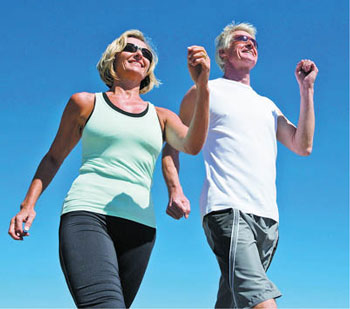Had an exhausting day? Think you deserve to kick back and relax? You might want to think again. If you’re like most people nationwide, you’ve spent more than half of your waking hours sitting or inactive for long stretches of timeat work, at school, in the car or watching TV or another type of screen. Maybe it’s time to try standing up instead of putting your feet up.
Scientists estimate that Americans ages 12 and up now spend most of their time—about 8 to 10 hours a day sitting and doing things that require little energy. The groups who sit the most are teens and older adults.
What’s so bad about sitting? Sedentary behavior—which usually means sitting or lying down while awake has been linked to a shorter lifespan and a wide range of medical problems.
Studies have found that any time you get up and move, you’re improving your chances for good health. “Some of us are sort of forced into sedentary lifestyles by our jobs, by school or by commuting,” says Dr. Donna Spruijt-Metz, who studies childhood obesity at the University of Southern California. “But research suggests that breaking up sedentary time with even short bouts of activity—like getting up from your desk and moving around—is associated with smaller waist circumference and other indictors of good health.”
When you’re upright and active, even briefly, your body is at work. “You’re engaging a wide range of systems in your body when you move throughout your day,” says Dr. Charles E. Matthews, who studies physical activity and cancer risk at NIH. “Your muscles are contracting, you’re maintaining your balance, and you’re resisting the force of gravity.”
When you’re sitting, Matthews says, “muscle contractions go way down, and your body’s resistance to gravity decreases.” When you sit for long periods, your body adapts to the reduced physical demand and slows down its metabolism. When metabolism slows, you burn fewer calories and boost the chance that extra energy will be stored as fat.
The best way to raise your metabolism is simply by moving. The more you move, the better. A new study led by NIH’s Dr. Steven Moore looked at data on more than 650,000 adults, mostly age 40 and older. The researchers found that leisure-time physical activity was linked to a longer life expectancy, regardless of how much people weighed.









